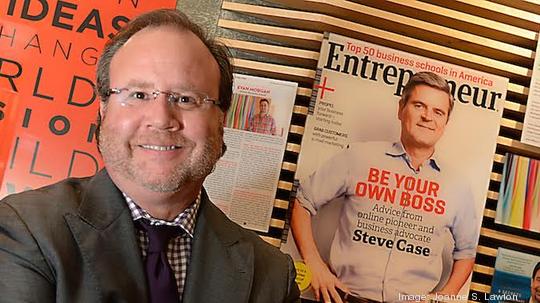
Revolution co-founder Donn Davis is a central architect for hundreds of millions of dollars invested in Washington, D.C.-area startups. The former AOL executive and chairman of Exclusive Resorts now helps oversee the $525 million Revolution Growth III fund and sits on the boards of several of Revolution's portfolio companies. Though lower profile than fellow partners Steve Case or Ted Leonsis, Davis' charm has closed many lucrative deals for Revolution, and his loyalty to the company has been critical to the more than $1 billion raised for Revolution's funds.
Where do you go to recharge and maintain your creativity?
Right here in the office, I designed it that way. For me, as someone who likes architecture as a hobby, that's what it's for. It's a place that's supposed to evoke both right brain and left brain. The fun for me is figuring how you design a space that works for both.
How did you end up getting into the position of office designer? What made you want to take on that role?
Steve [Case] was not very interested, and so I said 'I'll do that' and he said 'great' and that's how that worked. I've always been interested in space and how it feels; how it makes us work. Even as a kid I was always designing houses and golf courses so as an adult, I enjoyed the chance to be working with space, work with architects to design this space.
Do you see a unifying theme to your investments that ties them together like the office design?
Everyone talks about innovation and disruption, and when they use those words they're always talking about technology. But, there's also innovation and disruption in branding, in business models, in manufacturing and business processes and other parts of building a business or attacking an industry, aside from technology. And, I think that's what Revolution is particularly good at.
How do those companies stand out to you as investment opportunities?
Look at Sweetgreen. It's lettuce. Sweetgreen didn't invent lettuce, but it did invent a brand. It did bring new processes for fresh food. It's very disruptive very innovative, but it's not another app, it's not about hard science. And Shinola is very interesting, very disruptive. It speaks to a generation that isn't mine and is very innovative. They figured out how to manufacture in America when no one else has.
"You have to work together to combine the creative with the financial."
And it's those differences that make them worth investing in?
Not just that. You have to innovate, but you have to make money too. So, you have to work together to combine the creative with the financial. That's what I love.
What would you say is unique about the D.C. innovation scene?
Silicon Valley is good if your innovations are about tech, tech, tech, but, if your innovation is about anything else, D.C. has had as many startups as any other place. We have the universities, the money, the potential impact on policy, all the elements of an ecosystem are here. It used to be that Boston or New York were kind of the second city [to Silicon Valley] in the 80s and 90s, but now going it's to be D.C.
Why is that?
Policy. The more important policy is, the more important government is as a customer, the more D.C. has the advantage.
Are there unique negatives to D.C. too?
The only issue is one of, if you're not Silicon Valley, and we're not, you have to own up to it. You don't try to be Silicon Valley. The one advantage it has is a trillion engineers and we don't, we won't have that. So, if you are the next Facebook or the next Google, it's a disadvantage to be anywhere but Silicon Valley. If you're anything else, there's no disadvantage here. Imitating Silicon Valley is a problem in that it limits how D.C. thinks.
Who do you admire in D.C.?
It's not one person, it's the whole class of entrepreneurs in D.C. everything starts with entrepreneurs. People focus on investors, we're not the stars. The entrepreneur is where it starts. People focus on the media or deal makers or lawyers, none of them are stars. I love when I interview people and they all want to be entrepreneurs. In the 70s everyone wanted to be a doctor or lawyer, in the 80s it was bankers, in the 90s it was VCs and in the 2000s it was hedge funds. Now, it's entrepreneurs and that's great for the country.
What mistakes do you wish you could undo in your career?
There are so many. But resilience and being happy about being resilient is a quality you have to have. You have to remember but can't internalize failures too much. I have lessons learned but I try not to fixate on them too much.
What's the best advice you could give to an entrepreneur?
I want entrepreneurs to be both extremely confident in vision, but extremely open-minded that they don't know everything. That balance is critical for success. And I tell people that smart management teams matter. Given enough time, a team can figure anything out. The only reason they run out of time is they run out of money. That's why there are investors.
Featured image credit Joanne Lawton/WBJ




